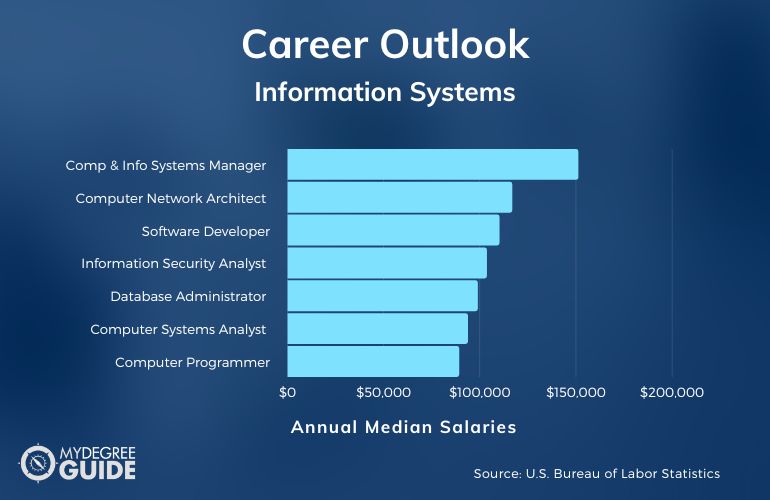An online information systems degree encompasses a variety of options for a degree.

Does technology ignite a fire within you? Are you interested in learning about different information systems and how they function within a business? If you answered “yes” to either of these questions, you may consider earning an online information systems degree.
Editorial Listing ShortCode:
This field is an integral aspect of most modern companies. There are many high-paying career paths you can pursue with the knowledge and skills you can acquire from an information systems major.
Universities Offering Online Bachelor’s in Information Systems Degree Programs
Methodology: The following school list is in alphabetical order. To be included, a college or university must be regionally accredited and offer degree programs online or in a hybrid format.
1. Arizona State University
Arizona State University’s Bachelor of Science in Computer Information Systems program is a 41 course program that teaches students to design, build, maintain, and repair information systems.
In addition to general education courses, there are also courses in business information systems development, mobile platforms for business, and managing cyber risks.
Arizona State University is accredited by The Higher Learning Commission.
2. Bellevue University
Students in Bellevue University’s Bachelor of Science in Computer Information Systems program will gain ample hands-on experience working with industry-standard networking and security software.
Students also learn to work with popular software applications, like Office 365, Microsoft Project, Microsoft SQL, and IE Microsoft Visual Studio. The curriculum includes 27 credits specific to the major.
Bellevue University is accredited by the Higher Learning Commission.
3. California University of Pennsylvania
The Bachelor of Science in Computer Information Systems program from California University of Pennsylvania is a 100% online program that includes courses in visual, web, and application programming, information systems, systems analysis, and decision support systems.
Students are introduced to plenty of professional connections and can participate in optional internships.
The California University of Pennsylvania is a university accredited by the Middle States Commission on Higher Education.
4. Champlain College
The computer and information systems bachelors program from Champlain College includes two 7 week terms per semester and 3 semesters each year. Students can transfer up to 90 of the required 120 credits from previously attended colleges. They can earn certificates in C++, software development, web design, and web programming.
Champlain College is accredited by the New England Commission of Higher Education.
5. City University of Seattle
City University of Seattle’s Bachelor of Science in Information Systems program can be taken either online, on-campus, or in hybrid format. It’s open to any student with a high school diploma, and it’s Washington’s only ABET accredited program of its kind. It teaches students to prepare solutions and develop project plans.
The City University of Seattle is accredited by the Northwest Commission on Colleges and Universities.
6. CUNY School of Professional Studies
CUNY School of Professional Studies offers a flexible Bachelor of Science in Information Systems program that’s entirely online. It allows students to build portfolios full of projects and presentations using programming languages, such as Python, C++, and other popular languages that are often required in the workplace.
The CUNY School of Professional Studies is accredited by the Middle States Commission on Higher Education.
7. Dakota State University
Students enrolled in the computer information systems bachelors program at Dakota State University will benefit from a good mixture of both business and information technology courses.
Students should learn to design, implement, and evaluate computing-based solutions, function effectively in the roles of team leaders, and operate productively within information systems environments.
Dakota State University is accredited by the Higher Learning Commission.
8. Davenport University
The Bachelor of Science in Computer Information Systems program from Davenport University offers four different specialty tracks in database and data analytics, web and mobile development, secure software development, and programming.
Course electives may vary slightly due to a student’s chosen specialty, but core courses are largely the same.
Davenport University is accredited by the Higher Learning Commission.
9. DeVry University
There are eight concentration options available with DeVry University’s computer information systems bachelors degree.
In addition to an undecided option, these include computer forensics, web game programming, web development and administration, database management, cybersecurity programming, information systems security, and software programming. All CIS students receive complimentary laptops and certification exam reimbursement.
DeVry University is accredited by The Higher Learning Commission.
10. Florida Tech
The 100% online Master of Science in Computer Information Systems program from Florida Tech is accessible 24 hours a day, 7 days a week. It allows students to learn from skilled industry practitioners and subject matter experts, and it facilitates collaboration between students via user-friendly and interactive online classrooms.
Florida Tech is accredited by the Southern Association of Colleges and Schools Commission on Colleges.
11. LeTourneau University
LeTourneau University provides a focused, hands-on approach in its Bachelor of Science in Computer Information Systems program. All courses are taught by professional, experienced faculty with several decades of experience.
The program is designed to teach students about designing, building, and implementing technical solutions to organizations’ various information technology problems.
LeTourneau University is accredited by the Southern Association of Colleges and Schools Commission on Colleges.
12. Liberty University
In addition to the general program, there are four concentration options in Liberty University’s Bachelor of Science in Information Systems program: accounting information systems, database, data networking, and information assurance.
The degree is flexible and affordable, and Liberty provides students with all the electronic textbooks for their classes free of charge.
Liberty University is accredited by the Southern Association of Colleges and Schools Commission on Colleges.
13. Loyola University – New Orleans
Students in the Bachelor of Science in Computer Information Systems program at Loyola University – New Orleans will be able to choose between two tracks: the entrepreneurship track and the management science track.
Students in both tracks will learn about various computer programming languages and advanced concepts in computer information systems.
Loyola University New Orleans is accredited by the Southern Association of Colleges and Schools Commission on Colleges.
14. McKendree University
McKendree University’s computer information systems bachelors program features flexible courses, one-on-one support from faculty members, and plenty of chances for students to gain real-world experience.
Courses come from both the business and computing departments, and students learn about computer programming, accounting, database administration, economics, software development, and management.
McKendree University is accredited by the Higher Learning Commission.
15. Mercy College
The Bachelor of Science in Computer Information Systems program at Mercy College prepares students for a myriad of different careers in tech-related business fields.
Graduates should be able to build databases and apps, demonstrate proficiency in programming and analyzing organizations’ needs, and build computer information systems to support those needs.
Mercy College is accredited by the Middle States Commission on Higher Education.
16. Mid-America Nazarene University
MidAmerica Nazarene University’s Bachelor of Science in Computer Information Systems program features two concentration options in cybersecurity and software engineering.
The school partners with several different organizations, companies, and schools in order to provide lower tuition costs to employees and their families. There are discounts for military as well.
MidAmerica Nazarene University is accredited by the Higher Learning Commission.
17. Monroe College
Students in Monroe College’s computer information systems bachelors program can take courses entirely online or in hybrid format. They’ll learn from professionals with years of experience in IT fields and gain lots of hands-on experience and industry-valued skills.
There are also certifications available in Network+, CCNA, A+, and Security+, among others.
Monroe College is accredited by the Middle States Commission on Higher Education.
18. National University
National University’s Bachelor of Science in Information Systems program allows students to focus on one course at a time, finishing each one in only 4 weeks. It teaches students about numerous computer-related activities and prepares them to work in a variety of fields, including criminal justice, healthcare, and government.
National University is accredited by the WASC Senior College and University Commission.
19. Northwestern State University of Louisiana
Northwestern State University of Louisiana offers a computer information systems bachelors program that’s nationally recognized for its excellence in several areas, including object-oriented programming, internet web design and development, database design and development, and systems analysis and design.
Students can also earn several certifications as part of the standard curriculum.
Northwestern State University is accredited by the Southern Association of Colleges and Schools Commission on Colleges.
20. Post University
The Bachelor of Science in Computer Information Systems program from Post University includes a curriculum that combines courses in business, computer science, and technology.
Heavy emphasis is also placed on mathematics, computing, and the ethical and legal matters involved in the most popular technical careers. Financial aid is also available to students who qualify.
Post University is accredited by the New England Commission of Higher Education.
21. Regis University
The computer information systems bachelors program from Regis University is an entirely online program that’s accredited by ABET. Courses last for 8 weeks at a time, and students can also earn a masters in information systems online or, if they choose, through on-campus learning, via the Fast Forward dual degree program option.
Courses include programming, enterprise systems architecture, and systems analysis and design.
Regis University is accredited by the Higher Learning Commission.
22. Saint Leo University
Saint Leo University’s computer information systems bachelors program is good for students hoping to pursue careers as security analysts, IT auditors, web developers, systems analysts, computer programmers, or technical support specialists.
Students have multiple opportunities for internships and for joining extracurricular activities, like the computing club and computer gamers club.
Saint Leo University is accredited by the Southern Association of Colleges and Schools Commission on Colleges.
23. Saint Louis University
Students in the Bachelor of Science in Computer Information Systems program at Saint Louis University can choose from concentrations in cybersecurity or data analytics to suit their future career goals. The program meets all five of the learning objectives for an ABET accredited CIS program and can be completed entirely online.
Saint Louis University is accredited by the Higher Learning Commission of the North Central Association of Colleges and Schools.
24. Southeast Missouri State University
The computer information systems bachelors program from Southeast Missouri State University is flexible, affordable, ABET accredited, and staffed with award-winning advising and coaching faculty and team leaders.
There are concentration options in cybersecurity, business administration, and artificial intelligence. Students can take classes year-round in order to earn their degrees faster.
Southeast Missouri State University is accredited by the Higher Learning Commission.
25. Southern New Hampshire University
Southern New Hampshire University’s Bachelor of Science in Computer Information Systems program features three concentration options in networking and security, project management, and data validation and decision making.
Graduates should be able to act as intermediaries between business and IT professionals and analyze business systems to identify the right technological solutions.
Southern New Hampshire University is accredited by the New England Commission of Higher Education.
26. Stevenson University
Students interested in either software design or network design can enroll in Stevenson University’s computer information systems bachelors program and choose one of the two available concentrations in those fields.
Core courses include management information systems, network technologies, information security for organizations, and advanced windows server architecture and administration.
Stevenson University is accredited by the Middle States Commission on Higher Education.
27. The College of St. Scholastica
The College of St. Scholastica offers both Bachelor of Arts and Bachelor of Science degrees in the field of computer information systems. Each program requires 128 credits to complete and includes a comprehensive curriculum that prepares graduates for work in a wide variety of IT careers. There are five concentrations available.
The College of St. Scholastica is accredited by the Higher Learning Commission.
28. Thomas Edison State University
For students hoping to pursue careers in computer information systems, Thomas Edison State University’s Bachelor of Science in Business Administration program in the field is a good choice. The curriculum focuses mainly on management information systems, and all students must complete capstone projects in strategic management before graduation.
Thomas Edison State University is accredited by the Middle States Commission on Higher Education.
29. University of Maine – Augusta
The University of Maine at Augusta offers degrees in computer information systems at the associates, bachelors, and graduate levels.
The bachelors program features courses that provide students with hands-on experience in security, networking, systems analysis, applications and web development, web design, operating systems, and database design.
The University of Maine at Augusta is accredited by the New England Commission of Higher Education.
30. Walden University
Walden University’s computer information systems bachelors program boasts an engaging curriculum, an excellent student support team, and courses in all of the most innovative and up-to-date technologies.
There are three concentration options in addition to the general program, and all concentrations feature a mix of academic theory and hands-on applications.
Walden is accredited by The Higher Learning Commission.
Online Information Systems Degrees
If you want to go into online information systems for your bachelors degree, there are a few different options you can choose from. Below are some of the most common online information systems degrees.
Select the program that most interests you to jump to that section of the guide:
Regardless of the specialty you select, you will still receive a strong foundation in business administration and related courses.
Management Information Systems

A management information systems degree program allows students to take classes in both business and management.
This program can help students understand how individuals and companies use data to inform as well as improve the decision-making process. Management information systems play a huge role in companies’ operations.
As a management information systems professional, you may bridge the gap between business, people, and technology. You may do this by working with employees, key stakeholders, and technology as well as by analyzing solutions that continue to meet the business’s goals.
Editorial Listing ShortCode:
Courses in management information systems may include topics such as database design, programming, and data analysis. Much of the coursework is business-related, with courses such as finance, accounting, leadership, management principles, customer service, and project management.
With an MIS degree, your career opportunities may include computer network architect, systems analyst, and database administrator.
Information Systems Security

A Bachelor of Science in Information Systems Security is focused on practical training. Courses may mostly involve science, computer engineering, computer and technology security, communications, and troubleshooting. When obtaining a degree in information systems security, it can help to understand complex technology.
Editorial Listing ShortCode:
A degree in information systems security can lead to various career options. You may become a computer programmer, management information systems director, computer support specialist, or computer systems analyst. With technology growing every year, the need for experts in information systems security continues to grow.
Information Systems Careers & Salaries

A high-paying job opportunity in this field is that of a computer and information systems manager. In this role, you may oversee computer-related activities in an organization, and you may plan, coordinate, and direct those aspects.
According to the Bureau of Labor Statistics, there are various career paths you can pursue with a degree in online information systems.
| Careers | Annual Median Salary |
| Computer and Information Systems Manager | $151,150 |
| Computer Network Architect | $116,780 |
| Software Developer | $110,140 |
| Information Security Analyst | $103,590 |
| Database Administrator | $98,860 |
| Computer Systems Analyst | $93,730 |
| Computer Programmer | $89,190 |
| Network and Computer Systems Administrator | $84,810 |
| Web Developer | $77,200 |
| Computer Support Specialist | $55,510 |
The employment for computer and information systems managers is projected to grow 10% in the next ten years, which is much higher than the average overall job growth rate.
Information Systems Curriculum & Courses

If you decide earn a bachelors in online information systems, some courses that you take may include:
- Information Systems: This course teaches about the complementary networks of hardware and software that people and organizations use. These networks process, create, filter, collect, and distribute data.
- Principles of Computing: This course teaches the essential ideas of computer science. It is a core level course for students with no prior experience.
- Reasoning with Data: You’ll learn how to make statistical decisions and reason with data. The course may emphasize thinking through an empirical problem using statistical tools.
- Math: Math is likely a basic level requirement for this major. The type of math course you take can vary depending on where you are.
- Computing: This course will give you practical skills in designing websites, software, or computer systems.
- Database Design and Development: You’ll learn how to prepare a database from scratch and how to make a better database using the standard industry principles.
- Web Technologies: This course covers the development of web applications, including cloud-based applications for handling business transactions and strategies.
- Fundamentals of Programming and Computer Science: This course is a technical introduction to the fundamentals of programming. It focuses on producing efficient and clear code. You learn how to do so using analysis, design, testing, and debugging.
- Application Design and Development: This course teaches you how to program, test, and implement an application for a business’s needs.
- Quantitative Analysis: In this course, you can learn how to use mathematical and statistical modeling, research, and measurement to understand a particular substance in a sample.
This list is not exhaustive, and there are many other courses you may take throughout your undergraduate education. This list is simply meant to give you an idea of some of the coursework you may encounter during your program.
Admissions Requirements

Admissions requirements vary from one program to another, but the following are some common requirements:
- SAT or the ACT scores, if required
- Letters of recommendation
- High school diploma
If you are interested in enrolling at a specific college or university, you can contact their admissions office or check their website to see what their admissions requirements are.
Accreditation

When deciding what college or university program to enroll in, accreditation status is a factor you may want to consider.
Regional accreditation is the official recognition that a school or program meets a certain standard of academic excellence. Accreditation also ensures that employers and other institutions will recognize and respect the degree that you earn.
A college’s website should display information on whether or not it is an accredited school. You can also reference the directory of accredited organizations that are recognized by the Council for Higher Education Accreditation (CHEA).
Financial Aid and Scholarships

If you qualify, financial aid may help you save on the cost of a degree. There are a few different options you can look into for financial help:
- Federal aid: The federal government has federal aid options available for students who qualify. To apply and find out if you qualify, you can fill out the Free Application for Federal Student Aid (FAFSA).
- State aid: Most states have a grant or scholarship available to residents along with student aid programs.
- Scholarships: Many programs have scholarships available to students who qualify. Some of them are need-based while others are merit-based. A school’s website or an advisor in the admissions office can help guide you to any available scholarships.
These options may help make your bachelors degree program more affordable if you qualify.
How Long Does It Take to Get an Information Systems Degree Online?

How long it takes to get a bachelors degree depends on the type of program you enroll in as well as whether you are a full-time or part-time student.
If you follow a traditional, 16 week semester and attend full-time, it will often take 4 years to earn a bachelors degree. If you follow an 8 week semester and stay continuously enrolled year-round, you may finish in less time.
What Is an Information Systems Degree?

An information systems degree covers a variety of business disciplines. This degree allows students to gain an understanding of the effective use of information technology in business and other organizational settings.
This field bridges business with computer science. An information systems degree will teach you about the systems, people, and processes designed to create, manipulate, store, disseminate, and distribute information.
Is Information Systems a Good Major?
Information systems is a major that opens up many career possibilities. The Bureau of Labor Statistics projects 11% job growth in computer and information technology occupations for the next 10 years, much faster than the average for all occupations.
Those who work in information systems often have an interest in computers, technology, systems, and applications and apply them to business. There are a wide range of career options as well, such as a computer systems analyst, database administrator, computer programmer, and web developer.
Is Information Systems Hard?

The difficulty level of an information systems major will often depend on your skills and interests. Information systems is a business and technology degree, and the curriculum reflects that.
Courses will likely involve business, technology, math, software, and applications. If you’re interested in these topics and would enjoy learning more about them, then information systems may be a major for you to consider.
Is Information Systems a STEM Major?
Yes, information systems is a STEM major. STEM majors include any majors that involve science, technology, engineering, or math.
Information systems can encompass most of those areas. It specifically involves technology, and you may have math and engineering as part of your coursework as well.
What Can You Do with an Information Systems Degree?
There are many career paths that you can pursue with an information systems degree. You may have a career in software development, computer programming, database administration, computer hardware engineering, web development, and computer and information systems management.
These are just a few of the job options you may have with an information systems degree. In addition to working, some students continue their education in graduate school, first earning a masters and then perhaps a PhD in Information Systems online, though some students prefer traditional classroom learning.
What Is the Difference Between a Bachelors in Information Systems vs. Computer Science?

Computer science degrees focus on computers. As a computer science major, you’d learn about subjects such as programming data structures, hardware, and algorithms.
The focus for a computer information systems degree is on the hardware and how to work with it. The curriculum for computer information systems, or a CIS degree, centers around computers and coding.
The major difference is in the application. With an information systems degree, there is more focus on how to apply technology to business.
What Is the Difference Between a BS in Information Systems vs. Information Technology?

Both of these fields deal with computers, but a degree in information technology (IT) focuses more on data. The coursework of an IT degree is built on storing, collecting, accessing, and protecting that data.
Information technology is a subset of information systems that incorporates the technology, people, and processes involved with information. IT professionals focus more on the hardware while information systems professionals integrate the technology with other systems.
Is an Information Systems Degree Worth It?

Yes, an information systems degree is worth it for many students. The Bureau of Labor Statistics is projecting 11% job growth in computer and information technology occupations over the next 10 years.
Common careers in this field for those with an information systems degree include database administrator, computer programmer, software developer, computer systems analyst, computer and information systems manager, and computer network architect.
Getting Your Information Systems Degree Online

Do computers intrigue you? Has the intersection of technology and business caught your eye? Are you partial to math, technology, web, software, and development?
If you want to learn about computers and how to apply the knowledge of those systems to an organization’s needs, then you may want to consider majoring in information systems. You can obtain your information systems degree online as well as in person.
Online learning offers you the flexibility of completing your coursework from the comfort of your own home. If this sounds appealing to you, you can begin your educational journey by researching and exploring accredited universities.
